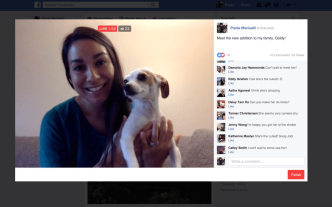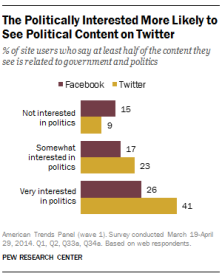How is the use of social media contributing to digital transformations in the fabric of everyday life?

Digital transformations as defined by I-scoop is a profound transformation of business and organizational activities with the use of digital technologies (i-SCOOP, 2018). These organizational activities also represent society today and everyday life. Digital transformation can be seen throughout society, with the advances in social media and how we communicate online being big landmarks in today’s digital transformation of society.
Social media is ever-changing. One of the newest additions and services that social media platforms such as Facebook, Instagram and Twitter offer are Live Streaming to an audience. Live streaming can have huge transformations for everyday life and now we go about receiving and broadcasting news, and how this effects us.
Facebook live was originally launched in March 2016 with incredible success (Bolton, 2 018). The service allowed users to almost instantly streaming from there phones to Facebook for all of there friends and followers to see and interact with the streamer. Platforms such as Twitter and Instagram also followed this and also began launching their own streaming services as a result. This now makes live streaming extremely accessible to everybody with an internet connection and a smartphone. A massive upside to this is that it makes mass communication accessible for everybody as before this technology took a lot more hardware and know how in order for it to be a success. The ability to produce live media so easily now also means that news about anything can be reported to hundreds upon thousands of people instantly at very little cost.
018). The service allowed users to almost instantly streaming from there phones to Facebook for all of there friends and followers to see and interact with the streamer. Platforms such as Twitter and Instagram also followed this and also began launching their own streaming services as a result. This now makes live streaming extremely accessible to everybody with an internet connection and a smartphone. A massive upside to this is that it makes mass communication accessible for everybody as before this technology took a lot more hardware and know how in order for it to be a success. The ability to produce live media so easily now also means that news about anything can be reported to hundreds upon thousands of people instantly at very little cost.
However, A huge downside to this is that live streaming has little to no respect for peoples privacy. The only control of privacy is the own morels of the streamer. For example, if a user is live streaming themselves walking through a busy city centre, all the people caught in the background of the stream will be put onto the internet without their permission or approval even if they don’t want to be caught on camera. This affects everyday life massively for some of us as nobody can possibly know whats being recorded and where on the internet it is going (Columbia Journalism Review, 2018). On the rest of Facebook, it’s users have to register and tell Facebook what people want to be shared about themselves, however, live streams open everybody and anybody up to the internet whether you would like to be or not.
A short 3-minute production was made that highlights the new form of social media and the following behind it. included there is also a simulation of a live stream which goes into detail about the pros and cons of the service. (Think Media, 2018) (CBS News, 2018) (Al Jazeera English, 2018)
 More recently Facebook has become under fire surrounding privacy and how the social media platform can change political and democratic votes in real elections around the world. After big events such as the election of Donald Trump as well as the Brexit vote, Facebook became targeted for using algorithms within its site that show political ads designed to change the way voters think (The Verge, 2018). This change in delegation effects everyday life massively by effecting democracy and thus deciding what happens to leaders, countries and the people.
More recently Facebook has become under fire surrounding privacy and how the social media platform can change political and democratic votes in real elections around the world. After big events such as the election of Donald Trump as well as the Brexit vote, Facebook became targeted for using algorithms within its site that show political ads designed to change the way voters think (The Verge, 2018). This change in delegation effects everyday life massively by effecting democracy and thus deciding what happens to leaders, countries and the people.
Digital transformations have also made it  effortless to communicate in everyday life. Before people would travel with letters days over oceans to transfer information however now a message can be sent and received almost instantly using most forms of social media such as whats app, facebook messenger and Reddit. As long-distance communication is now effortless, It allows users to achieve more with themselves as less effort is required to communicate. In the time it takes to write, send and receive a letter, those people using a modern technology such as social media would be much more efficient and productive as the cost of communicating is much less.
effortless to communicate in everyday life. Before people would travel with letters days over oceans to transfer information however now a message can be sent and received almost instantly using most forms of social media such as whats app, facebook messenger and Reddit. As long-distance communication is now effortless, It allows users to achieve more with themselves as less effort is required to communicate. In the time it takes to write, send and receive a letter, those people using a modern technology such as social media would be much more efficient and productive as the cost of communicating is much less.
 However, this ease of communication and exchanging of information can also lead to cybercrime, cyberbullying and malicious use of these platforms which greatly effects everyday life. Because communication over social media is easy, it’s been reported that criminals such as drug dealers are now using apps such as Instagram and Snapchat to push illegal and life-threatening drugs on to children as young as 13 (Stroud, 2018). It becomes obvious upon the realisation that these platforms do really help everybody communicate easier, however with a little more thought, it opens up room for criminals to operate easier as well as putting vulnerable children at risk. Social media and the internet also gives criminals a sence of anonymity as it’s easier to troll, threaten and break the law behind the safety of a keyboard and monitor rather than in the streets. These malicious people, however, are still part of everyday life and to have been affected by digital transformations even though it may not be the best for society.
However, this ease of communication and exchanging of information can also lead to cybercrime, cyberbullying and malicious use of these platforms which greatly effects everyday life. Because communication over social media is easy, it’s been reported that criminals such as drug dealers are now using apps such as Instagram and Snapchat to push illegal and life-threatening drugs on to children as young as 13 (Stroud, 2018). It becomes obvious upon the realisation that these platforms do really help everybody communicate easier, however with a little more thought, it opens up room for criminals to operate easier as well as putting vulnerable children at risk. Social media and the internet also gives criminals a sence of anonymity as it’s easier to troll, threaten and break the law behind the safety of a keyboard and monitor rather than in the streets. These malicious people, however, are still part of everyday life and to have been affected by digital transformations even though it may not be the best for society.
To conclude there are many ways in which social media contributes to digital transformities in everyday life from the ease of two-way communication between two people to giving people the ability to stream live events and report news from the click of a button. However, it has also been found that there are in fact many negative effects on everyday life as a result of these digital transformations and that not all digital transformations are healthy. One huge example of this is how criminals are turning online for their illegal activities which could put the wellbeing of children at risk.
Refrences
Bolton, D. (2018). Facebook live has arrived – here’s how to use it properly. [online] The Independent. Available at: https://www.independent.co.uk/life-style/gadgets-and-tech/news/facebook-live-streaming-how-to-use-tips-tricks-a6991741.html [Accessed 10 May 2018].
i-SCOOP. (2018). Digital transformation: online guide to digital transformation. [online] Available at: https://www.i-scoop.eu/digital-transformation/ [Accessed 11 May 2018].
Columbia Journalism Review. (2018). Could Facebook Live change the way courts think about privacy law?. [online] Available at: https://www.cjr.org/united_states_project/facebook_live_streaming_video_privacy_law.php [Accessed 12 May 2018].
CBS News (2018). Is live streaming the next big thing in social media?. Available at: https://www.youtube.com/watch?v=VGjbm4X2Foc [Accessed 13 May 2018].
Think Media (2018). Facebook LIVE Streaming Tutorial — 8 Facebook Live Tips. Available at: https://www.youtube.com/watch?v=x7CZHtEfXDw [Accessed 13 May 2018].
Al Jazeera English (2018). Is privacy really possible in this age of social media? | Inside Story. Available at: https://www.youtube.com/watch?v=QYTTWLdA9eI [Accessed 13 May 2018].
The Verge. (2018). Does Facebook think you’re liberal or conservative? Here’s how to find out. [online] Available at: https://www.theverge.com/circuitbreaker/2016/8/24/12621784/facebook-political-preferences-ads [Accessed 13 May 2018].
Stroud, C. (2018). Drug dealers using Instagram and Snapchat to target kids as young as 13. [online] The Sun. Available at: https://www.thesun.co.uk/news/5246624/drug-dealers-using-instagram-and-snapchat-to-target-children-as-young-as-13/ [Accessed 13 May 2018].